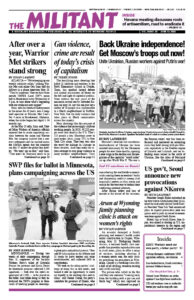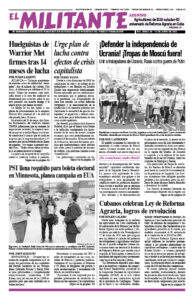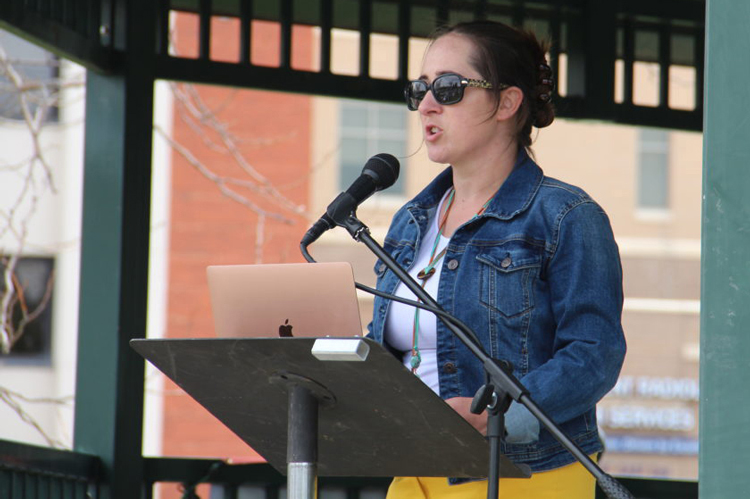An arsonist damaged a family planning and women’s health center under construction in Casper, Wyoming, May 25. Wellspring Health Access, a national health care nonprofit that provides reproductive care in rural areas, plans to offer a range of services, including abortion if a woman needs one, the only facility providing the procedure in Wyoming. Casper is a working-class city, a hub of oil drilling, uranium mining and cattle ranching.
The person who called in the fire said they saw someone “running away from the building with a gas can and black bag,” which was captured on surveillance video. No one has been apprehended.
“I’m angry that people would take it upon themselves to try to shut us down this way,” Julie Burkhart, a founder of the clinic, told the press. The clinic plans to make needed repairs, but its scheduled opening in June will likely have to be pushed back.
Since 1977 there have been 11 murders and 26 attempted murders of doctors who provide abortions as part of their practices, 42 bombings of clinics and homes, and 194 incidents of arson. It’s a history that Burkhart knows firsthand. She worked with Dr. George Tiller, a doctor who offered abortion in Kansas. He was shot dead in the foyer of his church by a rightist in 2009.
Needed discussion on access to family planning was cut short by the U.S. Supreme Court’s 1973 Roe v. Wade ruling that decriminalized most abortions, before millions had been convinced that access to the procedure was necessary as a part of family planning.
Fight for women’s emancipation
The heart of the discussion has to begin on a broader basis: how can working people start a family and hold one together. This includes the fight for jobs with better wages and work schedules that allow family time.
“Working people need access to affordable child care, health care and programs that make it easier to adopt,” Candace Wagner, Socialist Workers Party candidate for governor in Pennsylvania, told the Militant. “We need access to family planning, contraception and safe and secure abortion, the types of services that Wellspring Health Access is bringing to Casper.”
Buffeted by today’s crisis of capitalism that puts more and more pressure on working-class women and their families across the U.S., they find themselves with less and less choice about how to live their lives.
Among the backers of the Wellspring Health Access clinic in Casper are Riata Little Walker and her husband Ian. She told the Associated Press that she had considered herself “pro-life,” but when she got pregnant two years ago she was diagnosed with fetal heart and chromosomal abnormalities that doctors told her would likely cause her a traumatic miscarriage. She decided to get an abortion at a facility in Colorado.
“Not all aborted babies are unwanted,” she said. “This needs to be available for people when they need it, even if they wanted their baby and they have to make the hardest decision that any parent could possibly make.”
“When you find yourself in a difficult position, you just want to have choices,” she said.
Today’s shortage of baby formula is another stark example of what workers face trying to raise a family. Anxious parents are hunting from store to store and paying skyrocketing prices if they are lucky enough to find the formula their babies need.
In February — three months ago — the Federal Drug Administration ordered Abbott Laboratories to shut down its main plant due to contamination. The company accounts for some 48% of baby formula production in the U.S. There was no backup plan in place, no reserves, and President Joseph Biden’s administration didn’t think the problem was important enough to address until babies started being admitted to hospitals and the issue became a national scandal.
Moves to restrict family planning
Rightists and state governments aiming to eliminate the ability of women to make their own decisions on family planning confront the widespread availability of pills used for medication abortions. More than half of all abortions in the U.S. are now carried out this way, including from drugs that can be ordered online. Manufacturer GenBioPro has filed a federal lawsuit challenging a Mississippi law that requires women take the pill in the presence of a doctor and only obtain the drug through an in-person visit.
But no matter what the Supreme Court decides on Roe, the underlying questions facing women and their families will continue to spur public debate. It’s a much-needed discussion that working people should welcome and join. That’s what the Walkers decided.
Growing numbers of working women and men, from nurses to autoworkers and coal miners, are standing together on picket lines around the country over the economic and social conditions the working class faces today.
“These union battles include fights against cuts to real wages, forced overtime, life-draining schedules and other obstacles to family life,” Wagner said. “Such struggles also provide a foundation for the broader fight for women’s emancipation. That is central to organizing a working-class movement that is united, capable of taking power out of the hands of the capitalist class.”


